- Reference Number: HEY1030/2021
- Departments: Radiotherapy
- Last Updated: 31 July 2021
Introduction
This leaflet has been produced to give you general information. Most of your questions should be answered by this leaflet. It is not intended to replace the discussion between you and the healthcare team, but may act as a starting point for discussion. If after reading it you have any concerns or require further explanation, please discuss this with a member of the healthcare team.
Radiotherapy to the Head region can include treatment to the brain, optic nerve and base of skull.
What is radiotherapy?
External Beam Radiotherapy is the use of high energy X-rays to treat cancer. Radiotherapy works by causing damage to the cancer cells in the treatment area. Although some normal healthy cells are also damaged, these are able to recover and repair themselves. It is delivered using a machine called a Linear Accelerator or Linac for short. The picture shows the two different types of linear accelerators we have within the department.
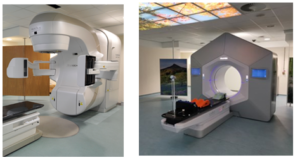
TrueBeam™ Linac Halcyon™ Linac
Figure 1: Linear Accelerators Radiotherapy department pictures
In order to give the healthy cells time to recover, your Oncology Consultant will prescribe a number of radiotherapy treatments which will be delivered daily from Monday to Friday (sometimes over weekends) over a number of weeks. A typical course of radiotherapy for the head lasts between 3 to 6 weeks and each radiotherapy session can take between approximately 15 to 20 minutes to deliver.
External Beam Radiotherapy does not make you radioactive and you are safe to be around others (including children) whilst you are having treatment. For more information, please refer to the leaflet ‘Introduction to Radiotherapy Treatment’ or speak to a member of your Healthcare Team.
Why do I need radiotherapy?
Radiotherapy treatment is commonly used in cancer treatment. It may also be combined with other treatments including Surgery and/or Systemic Anti-Cancer Therapy, (SACT). Before you start your treatment, your Oncology Consultant will discuss your treatment options with you and ask for your consent. For more information about consent and radiotherapy please refer to the ‘Consent Advice for Radiotherapy’ leaflet.
How should I prepare for radiotherapy?
Before and throughout your radiotherapy treatment you will be given opportunities to discuss your diagnosis and treatment with your Healthcare Team looking after you.
The side effects, you experience when undergoing your radiotherapy treatment are dependent on the area of the head you are having treated. Your Oncology Consultant and other members of your Healthcare Team will advise you as to which side effects, you will most likely develop.
If you have a beard or moustache you may be required to remove it before your mask is made, your consultant/neuro oncology CNS will discuss this with you if necessary.
SACT, Systemic Anti-Cancer Treatment and Radiotherapy
If you are undergoing SACT treatment along with radiotherapy treatment you may be required to attend for SACT treatment before you can start your radiotherapy treatment. You may also be having SACT at the same time as your radiotherapy. Your Oncology Consultant or another member of your Healthcare Team will discuss this with you if it is necessary.
What will happen?
Your first appointment with the Radiotherapy Department will be for an individual mask to be made for you; as well as a Computerised Tomography (CT) scan to be performed (please see figure 2 below). A Therapeutic Radiographer will meet you to discuss the procedure and ask for your consent. A Planning Dosimetrist may be present at this appointment and will explain the procedure before your mask is made.
Your mask will be made out of a special thermoplastic that becomes flexible when warm. Whilst some may find this procedure uncomfortable, your mask is very important as it will be used every day to keep you in the correct position whilst undergoing your treatment. It also usually avoids the need for drawing alignment marks on your skin.
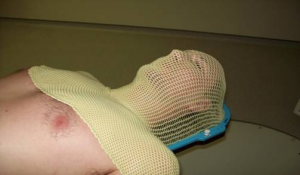
Figure 2: An individual mask (Radiotherapy Department Photograph)
If you wear dentures or hearing aids you will need to remove them. You may be required to have an injection during the CT scan to improve the quality of your scan. The injection contains a contrast medium which is like a dye and shows up some of the organs in your body better. If this is necessary, the Therapeutic Radiographer will ask you further questions to make sure it is safe for you to have the injection. If an injection is required, a Therapeutic Radiographer or CSW, Clinical Support Worker, will place a needle into your arm or hand and the injection will be given through this; once you are in position on the CT couch. The injection should not cause any side effects, but it can create a warm sensation through your body for a few minutes.
It will take typically 15 to 20 minutes to make your mask. Once your mask has been made you will undergo a CT scan (please see figure 3 below) in your mask. This will take approximately 10 minutes.
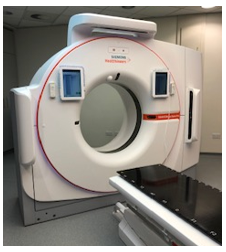
Figure 3: A CT Scanner (Radiotherapy Department photograph).
Using the scans from your CT, the Radiotherapy Planning Team will work with your Oncology Consultant to create a unique radiotherapy treatment plan. For more information, please refer to the leaflet ‘Introduction to Radiotherapy CT Planning’.
Your Oncologist may request for you to also have a Magnetic Resonance Imaging Scan (MRI) in your mask; this would take place after your CT Scan (please see figure 4 below). If you need to undergo an MRI scan, a member of staff will show you where you need to go for this scan. Prior to the MRI scan you will need to remove any metal objects. However, the MRI Radiographers will explain this and what the procedure involves to you in more detail.
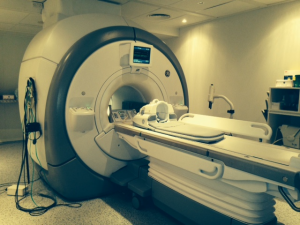
Figure 4: MRI scanner (Radiotherapy Department Photograph)
Your radiotherapy treatment will be carried out by a team of therapy radiographers. On the first day of your radiotherapy you may be required to have a check to ensure that your mask still fits you. This may be important if you are attending SACT before your radiotherapy. A Therapeutic Radiographer will also explain the procedure and the specific Linac movements to you and you will be given the chance to ask any questions you may have. The Therapeutic Radiographers will place your mask on you and will check that your position is correct for treatment (please see figure 5 below).
During your treatment The Therapeutic Radiographers will leave the treatment room whilst your radiotherapy is being delivered; however, they will be able to see you on a camera, so if you need their assistance you can raise your hand.
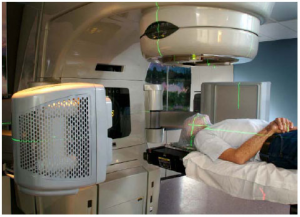
Figure 5: Delivering Radiotherapy (Radiotherapy Department photograph).
The treatment can take between 15 to 20 minutes to position and deliver. Images will be taken using the same machine to check your position.
What happens afterwards?
Once you have completed your treatment, you will be able to go home, unless you have requested to see a member of the support team or if a member of the support team needs to meet with you.
You will be given advice regarding your aftercare when you complete your treatment. This may include follow-up by the Clinical Nurse Specialists, (CNS), in your area.
A follow-up appointment will be made for you to see your Clinical Oncologist in a few weeks’ time.
After your initial treatment, you will continue to receive long term follow-up with the Neuro-Oncology Team. This is likely to involve having another scan at some point as well as seeing the team in the Neuro-Oncology Clinic. Your individual management plan will be discussed with you by the Doctors and Nurses caring for you.
Are there any side effects?
Radiotherapy also affects the normal healthy cells in the treated area. These cells are able to repair and recover from radiotherapy; however, this produces side effects. These may not develop as soon as you start your radiotherapy and may build up gradually throughout your treatment.
You will be prescribed medication to help ease the symptoms of any pain and discomfort caused by the radiotherapy. The side effects you may experience will depend on whereabouts in your head and neck that you are having treatment. Radiotherapy can cause swelling of the brain and this can cause symptoms to become slightly worse. These may include:
- Headaches
- Weakness of the limbs
- Increase in seizures
- Speech or memory problems.
If you are taking steroids the doses may need to be adjusted if these symptoms occur as this will reduce the swelling.
Please note:
- You are likely to feel more tired during your radiotherapy. This is a common side effect of the radiotherapy treatment; however, travelling to and from the radiotherapy department can also contribute to this. To help with fatigue it is important to listen to your body, it may help if you can plan your day so that you have time to rest and do things that are important to you when you feel less tired. However, you will need to plan your day around your treatment.
- You may need help with your everyday activities such as shopping, laundry and meal preparation. Family, friends and neighbours are often glad of the chance to lend a helping hand.
- The skin in the treated area will gradually become dry and slightly reddened, very much like It may even peel or weep. Your Healthcare Team will advise you on how to take care of your skin.
- Hair loss in the treated area can be very distressing, as it is important to everyone’s appearance and self-image. Hair roots directly within the treatment area will be damaged by radiotherapy causing the hair to fall out. Hair loss is usually temporary and it will grow back; however, it may not be as thick as it was before your treatment. The time it takes and the way it grows back depends on the dose of radiotherapy you have received.
- If your ear is included in the treated area, your hearing may be affected by the radiotherapy treatment. This is due to swelling inside your ear and will return too normal a few weeks after treatment has finished. Inside the ear may feel dry, sore and/or itchy, this is a normal reaction which will settle down when the treatment has finished.
- During your treatment and for a short period afterwards your appearance may be affected. As mentioned the skin mimics a severe sunburn appearance, which can be difficult to conceal when treating the face and neck. However, following treatment, the skin will heal with no permanent disfigurement.
Please speak to the therapeutic radiographers, doctors or nurses as soon as you notice any change in symptoms.
The peak effects of Radiotherapy will typically continue to build up for 7days after completion of your treatment. After that things should start to slowly improve over the next 4-6 weeks.
The side-effects described above are immediate or short-term side-effects from radiotherapy.
Radiotherapy does have medium and long-term side effects which your oncologist will have discussed with you prior to starting radiotherapy treatment. If you would like more information about these then please contact the Neuro-Oncology CNS team on tel: 01482 607831
This leaflet should have answered most of your questions. If you have any further questions, please ask any member of your healthcare team.
Should you require further advice on the issues contained in this leaflet, please do not hesitate to contact the Radiotherapy Support Team tel: 01482 461206. Monday to Friday 8.00am to 6.00pm, excluding weekends and Bank Holidays
Or by email: hyp-tr.radiotherapy.information@nhs.net
Please read the information leaflet. Share the information it contains with your partner and family (if you wish) so that they can be of help and support. There may be information they need to know, especially if they are taking care of you following this examination.
RESEARCH
The Trust is research-active with a research strategy that includes cancer treatment and care. The radiotherapy department participates in national and international research studies to improve treatments to make them safer, more effective and to reduce side effects. We also develop patient-centered local research to improve your radiotherapy experience to benefit you and your family. We would like to encourage you to feedback about your experiences and ideas to help us to research the areas that are important to you. Your treatment will not be affected in any way should you not wish to take part.
PREGNANCY
It is advisable that women do not become pregnant while having cancer treatment because the radiotherapy, chemotherapy, immunotherapy can have an effect on the unborn child. It is suggested that you use a barrier form of contraception (e.g. condoms). Please speak with your healthcare team if you have any questions.
RADIOTHERAPY STAFF
CLINICAL ONCOLOGIST, REGISTRAR, CONSULTANT THERAPEUTIC RADIOGRPHERS
They are experts in radiotherapy and will be managing your treatment. They will take the responsibility for deciding what dose and how many treatments will be best for you; they will oversee the planning of your treatment. You may see them or a member of their team at your initial planning appointment and you can see them during your treatment if you have any problems or queries.
THERAPEUTIC RADIOGRAPHERS
Radiotherapy is delivered by male and female therapeutic radiographers who are specialist healthcare professionals that are trained to plan and deliver radiotherapy treatment and to use the specialist equipment. You will usually see the same team of radiographers and they will assist you with any questions or problems or refer you to a more appropriate person.
RADIOTHERAPY SUPPORT TEAM
The team consists of Nurse Practitioners, Therapeutic Radiographers and Clinical Support Workers (CSW’s), who are based within the Radiotherapy Department where they actively support and advise patients receiving radiotherapy treatment. They offer advice to patients and their families/carers and are able to make appropriate referrals.
PHYSICISTS, PLANNING DOSIMETRISTS AND MACHINE TECHNICIANS
Medical physicists are specialist scientists who have a key role in the individual planning of your treatment, along with the planning technicians. They may also have an input into the set-up of your treatment. They work together with the machine technicians to ensure that the machines are reliable and working accurately.
STUDENTS
At some point during your treatment you may encounter student radiographers. Everything they do is supervised fully. If you would prefer our students not to be present during the planning and treatment, please let a member of staff know when you attend for your initial planning appointment.
OTHER MEMBERS OF STAFF
During your treatment course you may meet our receptionists, dieticians, oncology health staff, patient services staff, porters, volunteer workers. All are working together to provide you with a high quality of healthcare.
USEFUL CONTACTS
Here are contact details of useful organisations that provide information and support about cancer including radiotherapy treatments:
Cancer Psychological Service
Can help with achieving the best possible quality of life during and after your journey with cancer. Offer emotional support and practical help. Discuss any matters that are concerning you and your family. For a call back from the drop-in team call tel: 01482 461060 / tel: 01482 461061 Monday to Friday between 9.00am and 3.00pm
Macmillan Cancer Support
Provide information from specialist nurses on all aspects of cancer and its treatment, and on the practical and emotional aspects of living with cancer.
You can drop into the Macmillan Cancer Information Centre at the Queen’s Centre or call them on tel: 01482 461154 Monday to Friday 9.00am to 5.00pm. Alternatively, free phone the national help line: tel: 0808 808 0000 Monday to Friday 9.00am to 8.00pm.
Online: http://www.macmillan.org.uk
Write to Macmillan Cancer Support, 89 Albert Embankment, London, SE1 7UQ
General Advice and Consent
Most of your questions should have been answered by this leaflet, but remember that this is only a starting point for discussion with the healthcare team.
Consent to treatment
Before any doctor, nurse or therapist examines or treats you, they must seek your consent or permission. In order to make a decision, you need to have information from health professionals about the treatment or investigation which is being offered to you. You should always ask them more questions if you do not understand or if you want more information.
The information you receive should be about your condition, the alternatives available to you, and whether it carries risks as well as the benefits. What is important is that your consent is genuine or valid. That means:
- you must be able to give your consent
- you must be given enough information to enable you to make a decision
- you must be acting under your own free will and not under the strong influence of another person
Information about you
We collect and use your information to provide you with care and treatment. As part of your care, information about you will be shared between members of a healthcare team, some of whom you may not meet. Your information may also be used to help train staff, to check the quality of our care, to manage and plan the health service, and to help with research. Wherever possible we use anonymous data.
We may pass on relevant information to other health organisations that provide you with care. All information is treated as strictly confidential and is not given to anyone who does not need it. If you have any concerns please ask your doctor, or the person caring for you.
Under the General Data Protection Regulation and the Data Protection Act 2018 we are responsible for maintaining the confidentiality of any information we hold about you. For further information visit the following page: Confidential Information about You.
If you or your carer needs information about your health and wellbeing and about your care and treatment in a different format, such as large print, braille or audio, due to disability, impairment or sensory loss, please advise a member of staff and this can be arranged.

